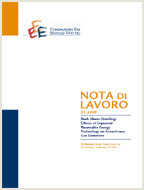A public finance perspective on climate policy: Six interactions that may enhance welfare

Data
20.04.2015
20.04.2015
Autori
Jan Siegmeier (Technische Universität Berlin, Mercator Research Institute on Global Commons and Climate Change); Linus Mattauch (Technische Universität Berlin, Mercator Research Institute on Global Commons and Climate Change); Max Franks (Technische Universität Berlin, Potsdam Institute for Climate Impact Research); David Klenert (Technische Universität Berlin, Potsdam Institute for Climate Impact Research); Anselm Schultes (Technische Universität Berlin, Potsdam Institute for Climate Impact Research); Ottmar Edenhofer (Technische Universität Berlin, Mercator Research Institute on Global Commons and Climate Change, Potsdam Institute for Climate Impact Research)
Codice JEL
B41, H21, H23, H54, H60, Q54
B41, H21, H23, H54, H60, Q54
Parole chiave:
Carbon Pricing, Taxation, Public Spending, Redistribution, Policy Interactions
Carbon Pricing, Taxation, Public Spending, Redistribution, Policy Interactions
Publisher
Climate Change and Sustainable Development
Climate Change and Sustainable Development
Editor
Carlo Carraro
Carlo Carraro
Climate change economics mostly neglects sizeable interactions of carbon pricing with other fiscal policy instruments. Conversely, public finance typically overlooks the effects of future decarbonization efforts when devising instruments for the major goals of fiscal policy. We argue that such a compartmentalisation is undesirable: policy design taking into account such interdependencies may enhance welfare and change the distribution of mitigation costs within and across generations. This claim is substantiated by analyzing six interactions between climate policy and public finance that are insufficiently explored in current research: (i) reduced tax competition in an open economy, (ii) portfolio effects induced through climate policy, (iii) restructuring public spending, (iv) revenue recycling for productive public investment, (v) greater intragenerational equity through appropriate revenue recycling and (vi) intergenerational Pareto-improvements through intertemporal transfers. We thereby structure the hitherto identified interactions between climate change mitigation and public finance and show that jointly considering carbon pricing and fiscal policy is legitimate and mandatory for sound policy appraisal.
***
Suggested citation: Siegmeier, J., L. Mattauch, M. Franks, D. Klenert, A. Schultes, O. Edenhofer, (2015), ‘A Public Finance Perspective on Climate Policy: Six Interactions That May Enhance Welfare’, Nota di Lavoro 31.2015, Milan, Italy: Fondazione Eni Enrico Mattei
